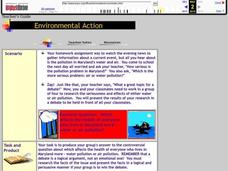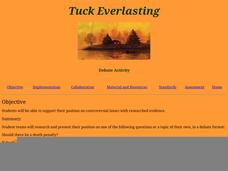State Bar of Texas
Dred Scott v. Sandford
Who decides someone is not a real person? Scholars investigate the Dred Scott v. Sandford court case which deals directly with slavery and citizenship. After viewing a short video clip, classmates work in pairs to assess and discuss the...
Curated OER
Beginning Your Inquiry
If you're starting a research project, use this guide to help young learners form the inquiry for their research. With steps that outline the entire process, including note taking and gauging the quality of an inquiry question, this...
State Bar of Texas
McCullough v. Maryland
Can a state government tax the federal government? The Supreme Court case McCullough v. Maryland explores different governments in the United States. Scholars research the court's decision with a video and discussion. They formulate...
National Endowment for the Humanities
Lesson 4 James Madison: Internal Improvements Balancing Act—Federal/State and Executive/Legislative
Who has the power? The founding fathers asked the same question when the United States was formed. Learners explore issues that arose during Madison’s presidency that raised constitutional questions. Through discovery, discussion, and...
National Endowment for the Humanities
Lesson 2 James Madison: The Second National Bank—Powers Not Specified in the Constitution
How much power is too much power for the federal government? Scholars use primary documents and constitutional research in groups to analyze the creation of the Second National Bank under James Madison. This is the second lesson of a...
National Endowment for the Humanities
James Madison: Raising an Army—Balancing the States and the Federal Government
To war! To war! Every nation in the history of the world has had to deal with warfare on some level. Scholars go through a series of activities and discussions surrounding the development of the Constitution to help them better...
Curated OER
A Year in Review: The Memoir
If you are planning a unit on memoir and autobiographical narrative, you should consider this resource. Using Internet research skills, pupils review works by James Frey and Henry David Thoreau. In response to these works, learners...
Chymist
The Extraction and Identification of Artificial Food Colors
Did you know some food dyes are considered safe while others are considered carcinogenic? During the experiment, young chemists extract artificial food colors from prepared foods. Then, they use chromatography paper to identify which...
James Madison Memorial Fellowship Foundation
Those "Other Rights:" The Constitution and Slavery
Did the United States Constitution uphold the institution of slavery, or did it help to destroy it? Young historians study Article 4, Section 2, Clause 3 of the Constitution and evaluate the rights of slaveowners as they compared to or...
Constitutional Rights Foundation
Arizona v. United States — States and Immigration Law
As part of a study of immigration law, class members read a summary of the Supreme Court case, Arizona v. United States. They then examine a series of examples and acting as federal court judges, must determine if the scenarios meet the...
Curated OER
Slavery's Opponents and Defenders
Students explore the wide-ranging debate over American slavery and the lives of its leading opponents and defenders and the views they held about America's "peculiar institution."
Curated OER
Ella y Él
Take a trip to Costa Rica with th popular song "Ella y Él" by Ricardo Arjona. After listening to the song (and possibly reading the lyrics) the class discusses the general message of the song, the political nature, and other US bands...
Curated OER
Evaluating the Strength of Scientific Evidence: The Rediscovery of the Ivory-billed Woodpecker
A happy discovery occurred in Arkansas in 2004: a woodpecker, believed to be extinct since the 1940s, reappeared! Or did it? Middle to high school ecologists examine scientific evidence and use critical-thinking skills to determine...
Curated OER
Environmental Action
Middle schoolers debate one another. In this pollution lesson, pupils work in teams to debate which is more serious, air or water pollution. They research their topic to come up with valid points to justify their side of the debate.
Curated OER
What Science Suggests About 'Weather Weirding'
Here is an activity that you can use to help upper elementary or middle schoolers to meet Common Core literacy standards for science and technology. Youngsters read the article on extreme weather patterns, "Weather Runs Hot and Cold, So...
Curated OER
The Four Revolutions of the 18th Century: Industrial, Demographic, Agricultural, and French
In need of lecture notes that will help you and your learners? Here you'll find a presentation that covers four major revolutions occurring in the 1800's; The French Revolution, The Industrial Revolution, the agricultural revolution, and...
Curated OER
Sentence Completion 20: High-Intermediate Level
Here's an exercise that will help learners develop their vocabulary. The eight sentence completion problems are followed by an answer key that explains why one answer is correct and why the other possibilities are not. Richly detailed,...
Sacramento State Masters of Educational Technology
Tuck Everlasting: Debate Activity
Use Tuck Everlasting as a springboard for a debate on big ideas about immortality and the death penalty. Take a week for research and debate by following the steps outlined in this plan. Tapping into technology for help, small groups...
Virginia Department of Education
Biotechnological Issues and Bioethics
Culminate a bioethics unit with the implementation of a lesson that incorporates the Socratic method to encourage class feedback and participation. Pupils participate in a discussion on bioethics and morality, complete a writing seminar,...
Constitutional Rights Foundation
Educating About Immigration The DREAM Act
Group members role play state legislators, supporters of and opponents to the The DREAM Act (Development, Relief, and Education for Alien Minors). After listening to the arguments put forth for and against the immigration legislation,...
Curated OER
The 44th and 45th USA Presidents
The transition of power between former President Barack Obama and President Donald Trump may be the first political process that your students have followed. Fill out the details between these two leaders with a set of vocabulary...
ProCon
Illegal Immigration
Should immigrants who illegally reside in the United States be eligible for citizenship? With information about undocumented immigrant population estimates, sanctuary cities, and unaccompanied immigrant children, pupils consider the pros...
History with Peters
A Clear Signal for Change: Multiple Interpretations and Nat Turner’s Rebellion
Was Nat Turner a hero or a violent criminal? Using primary sources and images that discuss the rebellion of enslaved people he led in antebellum Virginia, scholars consider the question. Then, they create memorials to Turner and...
Curated OER
Taking a Stand with Rosa Parks
Students discuss African-American history from slavery to the civil rights movement. They discuss individual people who shpaed history by reading their biographies and researching the age in which they lived. Studnets comprehend the...

























